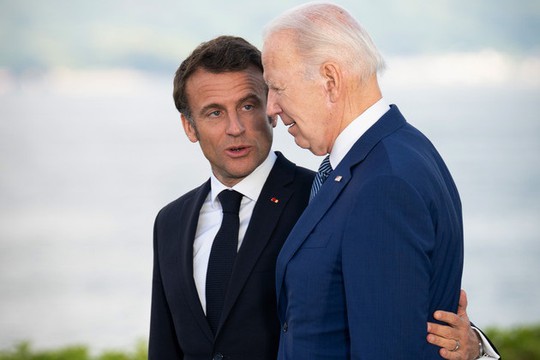U.S. President Joe Biden and French President Emmanuel Macron.
Photo: Getty Images
President Joe Biden and French President Emmanuel Macron on Saturday projected political solidarity on the wars in Ukraine and Israel, amid persistent strain on the international community’s approach to both conflicts.
The press statements came after a private meeting between the two and were a capstone to two days of largely ceremonial affairs for Biden, writes POLITICO.
“This week, we have shown the world once again the power of allies and what we can achieve when we stand together,” the president declared.
But the public show of unity, and the clipped nature of their public comments that avoided delving into the substance of their discussion, masked the significant daylight that exists between the two allies — disagreements that have taken on more urgency as G7 and NATO summits approach in the coming days and weeks.
Previewing Saturday’s meeting, national security adviser Jake Sullivan told reporters that the discussions would be both “sensitive” and “intense.” But the leaders did not announce many “deliverables” coming from their direct talks beyond an agreement to work more closely in the Indo-Pacific to build up maritime law enforcement capacity.
Among the main issues at play is how to continue supporting Ukraine’s defense against Russia’s invasion as the war enters its third year. Both Biden and Macron met with Ukrainian President Volodymyr Zelenskyy in Paris on Friday, eager to demonstrate their ongoing support.
But some Zelenskyy aides have grown frustrated with Biden’s cautiousness about a conflict he describes as an existential threat for NATO and democratic countries across the globe. Macron has suggested that allies send troops to Ukraine for training purposes and refuses to rule out, as other allies have, more direct military engagement with Russia in Ukraine at some point.
Macron had hoped to announce around this week’s D-day celebrations that France was going ahead with its plan to send up to several hundred soldiers to Ukraine to train up mine clearance teams and an armed vehicle brigade. But the plan appears to have hit a snag, complicated by threats of retaliation from Russia and the politics of this week’s EU elections. According to several French officials, Macron is still engaged in discussions about leading a coalition of countries that will send trainers to Ukraine.
Biden, meanwhile, is eager to move Macron his way on a plan to leverage $300 billion in seized Russian assets to generate additional aid for Ukraine now. Going into Saturday’s meeting, France remained the lone holdout among G7 allies on a U.S. plan to give Ukraine a $50 billion loan that would be repaid with interest from the seized assets. Biden met last week with Belgian Prime Minister Alexander De Croo to discuss the practicalities of the plan — the bulk of the seized assets are currently held in Brussels — and the EU has given its initial approval. Aides are optimistic they’ll be able to get Macron on board in time for a formal announcement at next week’s G7 summit in southern Italy.
Addressing economic frictions will also be a major part of Saturday’s agenda. Macron, staring down an electoral rebuke on Sunday with his party expected to finish second or third in France’s EU elections, needs the U.S. to soften its America-first trade policies that have softened growth across Europe — and left leaders like himself and German Chancellor Olaf Scholz politically vulnerable.
Europe, among allies, has borne the brunt of the economic fallout of the war in Ukraine after agreeing to halt imports of Russian energy and imposing sanctions on the Kremlin. Biden’s subsidies for manufacturing in the U.S., which Macron has criticized, could further harm European industries by diverting business investment.
Biden, meanwhile, is hoping to convince France and the rest of the EU to join the U.S. in boxing out Beijing from the global marketplace by raising tariffs on Chinese goods.
Macron has been nervous about letting Washington dictate Europe’s approach to Beijing, warning in an interview last year that continental leaders shouldn’t “blindly” follow the U.S. and get dragged into a messy trade war at a time when the economy is shaky and war has returned to European soil.
read more in our Telegram-channel https://t.me/The_International_Affairs

 8:27 10.06.2024 •
8:27 10.06.2024 •























